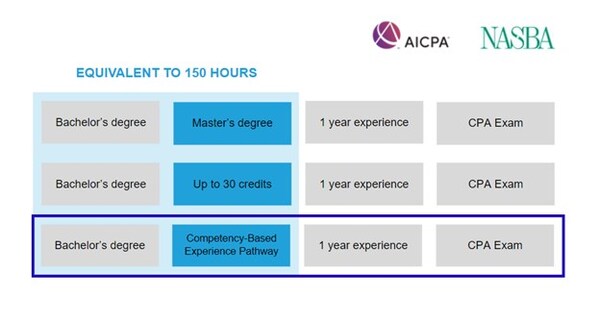The AICPA and the National Association of State Boards of Accountancy (NASBA) said on Thursday they are asking the public for feedback on a proposed new option for CPA candidates to meet their initial licensure requirements.
The CPA Competency-Based Experience Pathway would provide an additional way for candidates to demonstrate their professional and technical skills after earning a bachelor’s degree and meeting their state’s requirements for accounting and business courses.
Public input on the proposed competency framework and other aspects of the potential additional pathway can be submitted through Dec. 6.
In addition to passing the CPA exam, candidates for CPA certification must possess a bachelor’s degree or its equivalent from an accredited college-level institution. The candidate also must have completed 150 credit hours and one year of professional experience.
The competency-based pathway proposal comes at a time when the accounting talent pipeline is drying up, with many in the profession saying the 150-hour rule for CPA licensure has contributed to the lack of interest in the profession among young adults, along with subpar starting pay in public accounting and the long hours required to work, especially during busy season.
Because CPA candidates must complete 150 semester credit hours of education—30 credits beyond the typical 120 credit hours earned in a four-year undergraduate degree—many CPAs end up spending five years in college instead of four.
The National Pipeline Advisory Group (NPAG)—a 22-member panel comprised of mostly CPAs and other stakeholders in the accounting profession that was tasked by the AICPA last year to use a data-driven, highly collaborative, and inclusive approach to tackle issues that have led to declining numbers of accounting grads and CPA candidates—recommended that the licensure requirements include a competency-based model.
“We want to be clear that we very much value education. It makes people better, more well-rounded professionals when they go through that process. So NPAG is not recommending getting rid of education by any means,” Lexy Kessler, Mid-Atlantic regional leader for top 30 accounting firm Aprio and chair of NPAG, told CPA Practice Advisor last May. “It’s really trying to find a hybrid that will adapt better and evolve the CPA license to where the market is going, to where our business world is going, so we can be more nimble and adapt to changes more easily. The CPA exam will absolutely still be there, and it’s critical that the markets understand what we’re doing and there’s a public trust in protecting that as we go through this process.”
Under the proposal from the AICPA and NASBA, CPA candidates could meet initial licensing requirements by exhibiting their competency in specific professional and technical areas.
“For example, professional competencies include ethical behavior, critical thinking skills, and effective communication. Technical competencies include options in audit and assurance services, tax engagements, and financial reporting,” the AICPA said in an exposure draft on the proposal.
CPA candidates would still be required to earn a bachelor’s degree, complete one year of general experience, and pass the CPA exam to receive licensure.

The AICPA and NASBA said they received significant input and advice for the competency framework from a diverse cross-section of the profession, including members of an AICPA and NASBA working group made up of practitioners, regulators, academics, and state society leaders.
Last November, the Professional Licensure Task Force was established by NASBA to consider new concepts for CPA licensure that may be included in the Uniform Accountancy Act (UAA) to update the current licensure model. The task force included representatives from NASBA’s board of directors, board of accountancy members and executive directors, AICPA executive leadership, and NASBA executive leadership. The task force’s primary focus was to develop an equivalent pathway to be included in the UAA that focused on enhanced experience for licensure.
In a report in July, NPAG outlined three concepts that build on each other and shift direction toward measuring competency versus just academic experience.
“This pathway represents a first step toward NPAG’s goal by incorporating competency-based concepts into the licensure path,” the AICPA said in the exposure draft. “Currently, candidates develop or enhance these competencies by either earning a master’s degree or bachelor’s degree and up to 30 additional credit hours at an institute of higher learning.”
The framework at the center of the proposal includes seven professional and three technical competencies. Candidates would be required to exhibit all professional competencies and at least one of the three technical competencies, which would be verified by one or more evaluators in their organization.
The proposed professional competencies include:
- Ethical behavior
- Critical thinking and professional skepticism
- Communication
- Collaboration, teamwork, and leadership
- Self-management and continuous learning
- Business acumen
- Technology mindset
“Candidates should look to professional competencies as the tools needed to effectively manage themselves while undertaking technical accounting tasks,” the AICPA said in the exposure draft. “Many professional competencies, such as ethical behavior, are foundational and are pervasive and integral to all tasks completed by a CPA. Others may apply only in specific situations or need to be adapted depending on the context. The candidate must exhibit all seven professional competencies.”
The proposed technical competencies include:
- Audit and assurance
- Tax
- Business and financial reporting
“Candidates apply the content knowledge and skills obtained in education and develop the required technical competencies in the area or areas in which they practice,” the AICPA said in the exposure draft. “The technical competencies are exhibited in tandem with the professional competencies.”
Attaining the competencies is expected to take most candidates a year but there is flexibility in the timing for completion. Competencies would be verified in the workplace by licensed CPAs.
“Our goal is to ensure that accounting professionals have the necessary experience, knowledge, and competencies to handle the complex nature of CPA work while also providing paths to licensure that reflect market conditions and make licensure as accessible as possible,” said Susan Coffey, CEO of Public Accounting for the AICPA. “Feedback from the profession is essential to building a workable pathway.”
NASBA President and CEO Daniel Dustin added, “The proposed pathway encompasses the perfect mix of flexibility for CPA candidates while maintaining rigor for public protection. We look forward to the input and direction from the 55 U.S. boards of accountancy on this important and necessary framework to strengthen the CPA pipeline.”
Thanks for reading CPA Practice Advisor!
Subscribe Already registered? Log In
Need more information? Read the FAQs




